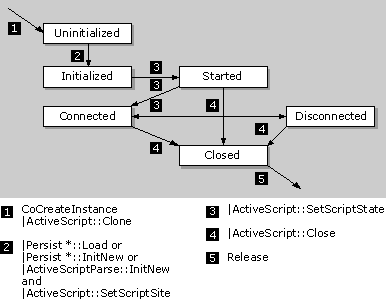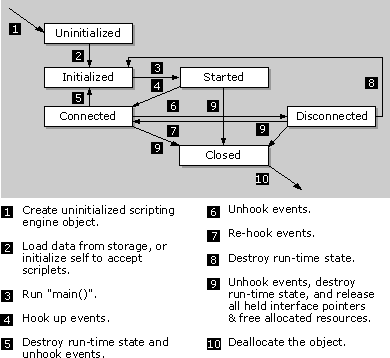To implement an Microsoft® Windows® Script engine, create an OLE COM object that supports the following interfaces.
| Interface | Description | ||||||||||
| IActiveScript | Provides the basic scripting ability. Implementation of this interface is required. | ||||||||||
| IActiveScriptParse | Provides the ability to add script text, evaluate expressions, and so on. Implementation of this interface is optional; however, if it is not implemented, the script engine must implement one of the IPersist* interfaces in order to load a script. | ||||||||||
| IPersist* | Provides persistence support. Implementation of at least one of the following interfaces is required if IActiveScriptParse is not implemented.
|
Note: It is possible that the scripting engine will never be called upon to save or restore a script state through IPersist*. Instead, IActiveScriptParse is used by calling IActiveScriptParse::InitNew to create a blank script, then scriptlets are added and connected to events with IActiveScriptParse::AddScriptlet and general code is added with IActiveScriptParse::ParseScriptText. Nonetheless, a scripting engine should fully implement at least one IPersist* interface (preferably IPersistStreamInit), because other host applications may try to make use of them.
The following sections describe implementing a Windows Scripting engine in more detail.
See the Script Interface Reference for more information.
Registry Standard
An Windows Script engine can identify itself using component categories. Windows Script currently defines two component categories.
Category Decription CATID_ActiveScript Indicates that the class identifiers (CLSIDs) are Windows Script engines that support, at a minimum, the IActiveScript interface and a persistence mechanism (the IPersistStorage, IPersistStreamInit, or IPersistPropertyBag interface). CATID_ActiveScriptParse Indicates that the CLSIDs are Windows Script engines that support, at a minimum, the IActiveScript and IActiveScriptParse interfaces. Although IActiveScriptParse is not a true persistence mechanism, it does support the IActiveScriptParse::InitNew method that is functionally equivalent to IPersist*::InitNew.
Script Engine States
At any given time, an Windows Script engine can be in one of several states.
State Descriptioon uninitialized The script has not been initialized or loaded using an IPersist* interface, or does not have an IActiveScriptSite interface set. The scripting engine is generally not usable from this state until the script is loaded. initialized The script has been initialized with an IPersist* interface and has an IActiveScriptSite interface set, but is not connected to host objects and sinking events. Note that this state simply means that the IPersist*::Load, IPersist*::InitNew, or IActiveScriptParse::InitNew method has been completed, and that the IActiveScript::SetScriptSite method has been called. The engine cannot run code in this mode. The engine queues code that the host passes to it through the IActiveScriptParse::ParseScriptText method, and executes the code after transitioning to the started state. Because languages can vary widely in semantics, scripting engines are not required to support this state transition. Engines that support the IActiveScript::Clone method must, however, support this state transition. Hosts must prepare for this transition and take the appropriate action: release the current scripting engine, create a new scripting engine, and call IPersist*::Load, IPersist*::InitNew, or IActiveScriptParse::InitNew (and possibly also call IActiveScriptParse::ParseScriptText). Use of this transition should be considered an optimization of the above steps. Note that any information the scripting engine has obtained about the names of Named Items and the type information describing Named Items remains valid.
Because languages vary widely, defining the exact semantics of this transition is difficult. At a minimum, the scripting engine must disconnect from all events, and release all of the SCRIPTINFO_IUNKNOWN pointers obtained by calling the IActiveScriptSite::GetItemInfo method. The engine must re-obtain these pointers after the script is run again. The scripting engine should also reset the script back to an initial state that is appropriate for the language. VBScript, for example, resets all variables and retains any code added dynamically by calling IActiveScriptParse::ParseScriptText with the SCRIPTTEXT_ISPERSISTENT flag set. Other languages may need to retain current values (such as Lisp because there is no code/data separation) or reset to a well-known state (this includes languages with statically initialized variables).
Note that the transition to the started state should have the same semantics (that is, it should leave the scripting engine in the same state) as calling IPersist*::Save to save the scripting engine, and then calling IPersist*::Load to load a new scripting engine; these actions should have the same semantics as IActiveScript::Clone. Scripting engines that do not yet support IActiveScript::Clone or IPersist* should carefully consider how the transition to the started state should behave, so that such a transition would not violate the above conditions if IActiveScript::Clone or IPersist* support was later added.
During this transition to the started state, the scripting engine will disconnect from event sinks after the appropriate destructors, and so on, are executed in the script. To avoid having these destructors executed, the host can first move the script into the disconnected state before moving into the started state.
Use IActiveScript::InterruptScriptThread to cancel a running script thread without waiting for current events, and so on, to finish running.
started The transition from the initialized state to the started state causes the engine to execute any code that was queued in the initialized state. The engine can execute code while in the started state, but it is not connected to any events added through the IActiveScript::AddNamedItem method. The engine can execute code by calling the IDispatch interface obtained from the IActiveScript::GetScriptDispatch method, or by calling IActiveScriptParse::ParseScriptText. It is possible that further background initialization (progressive loading) is still ongoing, and that calling the IActiveScript::SetScriptState method with the SCRIPTSTATE_CONNECTED flag set may cause the script to block until initialization is complete. connected The script is loaded and connected for sinking events from host objects. If this is a transition from the initialized state, the scripting engine should transition through the started state, performing the necessary actions, before entering the connected state and connecting to events. disconnected The script is loaded and has a run-time state, but is temporarily disconnected from sinking events from host objects. This can be done either logically (ignoring events received) or physically (calling IConnectionPoint::Unadvise on the appropriate connection points). If this is a transition from the initialized state, the scripting engine should transition through the started state, performing the necessary actions, before entering the disconnected state. Event sinks that are in progress are completed before the state changes (use IActiveScript::InterruptScriptThread to cancel a running script thread). This state is distinguished from the initialized state in that the transition to this state does not cause the script to reset, the run-time state of the script is not reset, and a script initialization procedure is not executed. closed The script has been closed. The scripting engine no longer works and returns errors for most methods. The following illustration shows the relationships between the various scripting engine states, and shows the methods that cause transitions from one state to another.

The following illustration shows the actions that the scripting engine performs during the various state transitions.

Scripting Engine Threading
Because an Windows Script engine can be used in many environments, it is important to keep its execution model as flexible as possible. For example, a server-based host may need to preserve a multithreaded design while using Windows Script in an efficient manner. At the same time, a host that does not use threading, such as a typical application, should not be burdened with threading management. Windows Script achieves this balance by restricting the ways a free-threaded scripting engine can call back to the host, freeing hosts from this burden.
Scripting engines used on servers are typically implemented as free-threading COM objects. This means that methods on the IActiveScript interface and its associated interfaces can be called from any thread in the process, without marshaling. (Unfortunately, this also means that the scripting engine must be implemented as an in-process server, because OLE does not currently support interprocess marshaling of free-threaded objects.) Synchronization is the responsibility of the scripting engine. For scripting engines that are not internally reentrant, or for language models that are not multithreaded, synchronization could be as simple as serializing access to the scripting engine with a mutex. Of course certain methods, such as IActiveScript::InterruptScriptThread, should not be serialized in this way so that a stuck script can be terminated from another thread.
The fact that IActiveScript is typically free-threaded generally implies that the IActiveScriptSite interface and the host's object model should be free-threaded as well. This would make implementation of the host quite difficult, particularly in the common case where the host is a single-threaded Microsoft Windows®-based application with single-threaded or apartment-model ActiveX Controls in its object model. For this reason, the following constraints are placed on the scripting engine's use of IActiveScriptSite:
- The script site is always called in the context of a host thread. That is, the scripting engine never calls the script site in the context of a thread that the scripting engine created, but only from within a scripting engine method that was called from the host through IActiveScript and its derivatives, through the exposed scripting engine's dispatch object, through a Windows message, or from an event source in the host's object model.
- The script site is never called from within the context of a simple thread state control method (for example, the IActiveScript::InterruptScriptThread method) or from the IActiveScript::Clone method.